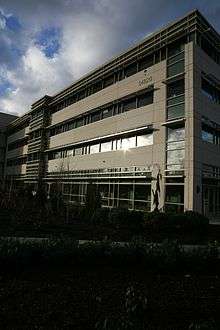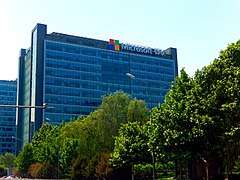Microsoft Research
Microsoft Research (MSR) is the research subsidiary of Microsoft. It was formed in 1991, with the intent to advance state-of-the-art computing and solve difficult world problems through technological innovation in collaboration with academic, government, and industry researchers. The Microsoft Research team employs more than 1,000 computer scientists, physicists, engineers, and mathematicians, including Turing Award winners, Fields Medal winners, MacArthur Fellows, and Dijkstra Prize winners.
Between 2010 and 2018, 154,000 AI patents were filed worldwide, with Microsoft having by far the largest percentage of those patents, at 20%.[1]
Research labs in most companies are usually focused on R&D efforts to directly improve their own future products. However, the primary mission of Microsoft Research is to perform fundamental science and engineering research with the intent of publishing top-tier academic papers in computer science and a few related fields.
Key people
Microsoft Research includes the core Microsoft Research labs and Microsoft Research AI, Microsoft Research NeXT (for New Experiences and Technologies), and other incubation efforts all directed by corporate vice president Peter Lee.
Research areas
Microsoft research is categorized into the following broad areas:[2]
- Algorithms and theory
- Communication and collaboration
- Computational linguistics
- Computational science
- Computer vision
- Computer systems and networking
- Data mining and management
- Economics, including and computational economics
- Education
- Gaming
- Graphics and multimedia
- Hardware and devices
- Health and well-being
- Human–computer interaction
- Machine learning and artificial intelligence
- Mobile computing
- Quantum computing
- Search, information retrieval, and knowledge management
- Security and privacy
- Social media
- Social sciences
- Software development
- Tools and languages
- Speech recognition, synthesis, and dialog systems
- Technologies for emerging markets
Microsoft Research sponsors the Microsoft Research Fellowship for graduate students.
Research laboratories
Microsoft has research labs around the world including the following non-exhaustive list:[3]

- Microsoft Research Redmond was founded on the Microsoft Redmond campus in 1991. It has about 350 researchers and is headed by Donald Kossmann. The bulk of research on the Redmond, Washington campus focuses on research areas such as theory, artificial intelligence, machine learning, systems and networking, security, privacy, HCI, and wearable technologies.
.jpg)
- Microsoft Research Cambridge was founded in the United Kingdom in 1997 by Roger Needham and is headed by Christopher Bishop. Antony Rowstron and Abigail Sellen are Deputy Directors and the Director of Innovation is Haiyan Zhang. The Cambridge lab conducts basic computer science research on a wide variety of topics, including machine learning, security and information retrieval, and maintains close ties to the University of Cambridge and the University of Cambridge Computer Laboratory.
- Microsoft Research Asia was founded in Beijing in November 1998. Microsoft Research Asia has expanded rapidly and grown into a world-class research laboratory with more than 230 researchers and developers and more than 300 visiting scientists and students, whose focus includes natural user interfaces, next-generation multimedia, data-intensive computing, search and online advertising, and computer science fundamentals.
- Microsoft Research India is sited in Bengaluru (Bangalore) and is headed by Sriram Rajamani.[4]
- Microsoft Research Station Q, located on the campus of the University of California, Santa Barbara, was founded in 2005. Station Q's collaborators explore theoretical and experimental approaches to creating the quantum analog of the traditional bit—the qubit. The group is led by Michael Freedman.
- Microsoft Research New England was established in 2008 in Cambridge, Massachusetts by Jennifer Chayes adjacent to the MIT campus. The New England lab builds on Microsoft's commitment to collaborate with the broader research community and pursues new, interdisciplinary areas of research that bring together core computer scientists and social scientists to understand, model, and enable the computing and online experiences of the future.
- Microsoft Research New York City was established on May 3, 2012. Jennifer Chayes serves as Managing Director of this location as well as the New England lab, with researchers from both labs working in concert. The New York City lab collaborates with academia and other Microsoft Research labs to advance the state of the art in computational and behavioral social sciences, computational economics and prediction markets, machine learning, and information retrieval.
- Microsoft Research Montreal was established after the acquisition of Maluuba by Microsoft in 2017. Jennifer Chayes serves as Managing Director of this location as well as the New England and New York City labs. The Montreal lab collaborates with academia and other Microsoft Research labs to advance the state of the art in natural language processing (specifically machine reading comprehension), deep learning and reinforcement learning.[5]
Former research laboratories
- Microsoft Research Silicon Valley,[6] located in Mountain View, California, was founded in August 2001 and closed in September 2014. Silicon Valley research focused on distributed computing and included security and privacy, protocols, fault-tolerance, large-scale systems, concurrency, computer architecture, Internet search and services, and related theory.
Collaborations
Microsoft Research invests in multi-year collaborative joint research with academic institutions at Barcelona Supercomputing Center,[7] INRIA,[8] Carnegie Mellon University, Massachusetts Institute of Technology, São Paulo Research Foundation (FAPESP), the Microsoft Research Centre for Social NUI and others.[9][10]
See also
References
- Louis Colombus, January 6, 2019 Microsoft Leads The AI Patent Race Going Into 2019, Forbes
- "Microsoft Research – Emerging Technology, Computer, and Software Research". Archived from the original on 29 April 2018. Retrieved 26 January 2017.
- "About Research at Microsoft – Microsoft Research". Archived from the original on 11 December 2016. Retrieved 26 January 2017.
- "About Research at Microsoft – Microsoft Research". Microsoft. Archived from the original on 5 July 2019.
- "Microsoft Research Montreal".
- "Class of 18th September 2014". MSR Silicon Valley. Retrieved April 20, 2017.
- "BSC-Microsoft Research Centre - BSC-Microsoft Research Centre". Retrieved 26 January 2017.
- "Microsoft Research Inria Joint Centre". Archived from the original on 29 June 2012. Retrieved 26 January 2017.
- "Academic Programs - Microsoft Research". Retrieved 26 January 2017.
- "Microsoft India Development Center - MSIDC". www.microsoft.com.
External links
| Wikimedia Commons has media related to Microsoft Research. |
- Official website
- The Microsoft Research Blog
- Microsoft Developing Project (news archive from Softpedia)
